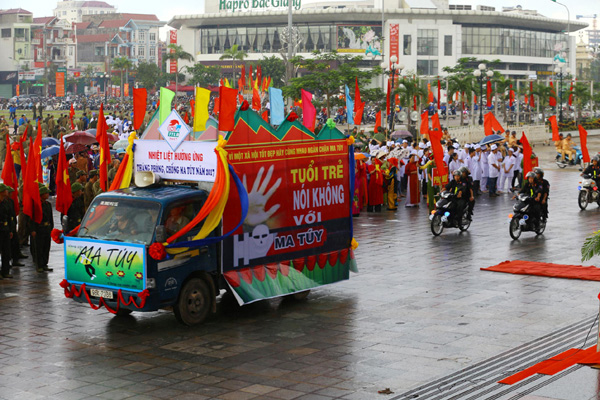 Op-Ed
Op-Ed


|
| An event to promote communication against drug trafficking and addiction in Bắc Giang Province. — Photo tuyengiao.vn |
In the first five months of this year, police discovered more than 10,200 cases related to drugs trafficking.
Almost 12,000 people were involved, and more than three tonnes of methamphetamine, one tonne of heroin and millions of methamphetamine pills were seized.
Minister of Public Security General Tô Lâm told National Assembly deputies just a few days ago that this was only the tip of iceberg.
He said every 340 grams of drugs transported into Việt Nam would leave at least 10 households in legal troubles, with family members going to prison for offences ranging from transporting to storing and distributing drugs.
The minister said his ministry had tried to tackle this dangerous trend, citing large-scale drug busts in recent times.
But that’s not a victory to be proud about, as drug crimes are still on the rise.
Just two days ago, police raided a party in HCM City where 63 people tested positive for drugs.
The same day, the wife of Vi Văn Nhất, a soldier, cried her heart out at her husband’s funeral. He had been shot dead while chasing a group of drug traffickers the day before.
Many officers like Nhất have died in the fight against drugs, and many families have been torn apart by the actions of drug traffickers. What’s more, there’s not a day goes by where we don’t hear of a new drug crime case.
The head of the police sector also blame the rise on drugs crimes on the fact that Việt Nam’s long borders, multiple ports and easy overland connectivity with other countries make the country a prime location for transiting drugs.
Drugs are transported from the Golden Triangle, which lies at the intersection of Laos, Thailand and Myanmar, to Việt Nam to be sent to a third country. Drug criminals take advantage of the Government’s more relaxed customs policies to move their products into Việt Nam and then onwards.
To deal with this, tighter customs policies need to be put in place. It’s time for Việt Nam to take drastic measures to prevent the country from being a drug smuggling depot and curb domestic drug use.
The Ministry of Public Security reported in 2018 that there were more than 225,000 drug addicts in Việt Nam, but the actual number is likely much larger.
Drug addicts are easy to spot, so surely their dealers must be easy to find too?
The answer to this problem isn’t stricter laws, as in Việt Nam, possession of more than 600 grams of heroin or cocaine or more than 2.5 kg of methamphetamine carries the death penalty, while the production or sale of 100 grams of heroin or 300 grams of other illegal narcotics is also punishable by death.
But harsh punishment clearly isn’t enough, as there are 1,600 overdose deaths annually, US$93.7 million is spent on buying drugs and $43 million on rehabilitation facilities.
Prime Minister Nguyễn Xuân Phúc earlier this month asked all ministries, agencies and local authorities to launch an action month against drugs.
We have had many programmes and campaigns, but the Government and citizens should remember the “action month” is not for advertising – it has to bring results.
For this action month and beyond, education on drugs must be more practical – students must be shown images of drug abusers who injured or killed other people. They must be made frightened of drugs.
That’s not all, all drivers tested positive to heroin must be forever banned from driving.
Police should also step up their efforts and launch huge raids, as each gram of drugs seized is a gram not being consumed.
Drug addicts as criminals?
When we come across someone in this country with an addiction, should we be giving them a helping hand or a handcuff?
Given the fact that drug-related crimes have increased significantly in recent years, Minister Tô Lâm said the country must consider making drug use a criminal offence again.
In 1999, Việt Nam’s law stipulated that drug addicts could be sentenced with forced rehab or between three months to two years in jail. The Government, however, converted the mandatory centres into community-based rehab facilities in 2013.
But the Government should help addicts, rather than punish them, since only by recognising drug addicts as sick patients can they quit and reintegrate back into the community.
In many countries, counseling organisations are available to help drug addicts – because it’s a battle to come back to normal life. Criminalising drug use is not always the correct path.
Putting drug addicts in touch with the criminal justice system will not break their addiction. That approach would be a failure in our duties of providing a modern health service and efforts to build a compassionate, tolerant society that wants to look after and care for people.
Addiction is considered a sickness in many places, and it can be defeated — and we should know that our community can beat this epidemic if we fight it together. — VNS




